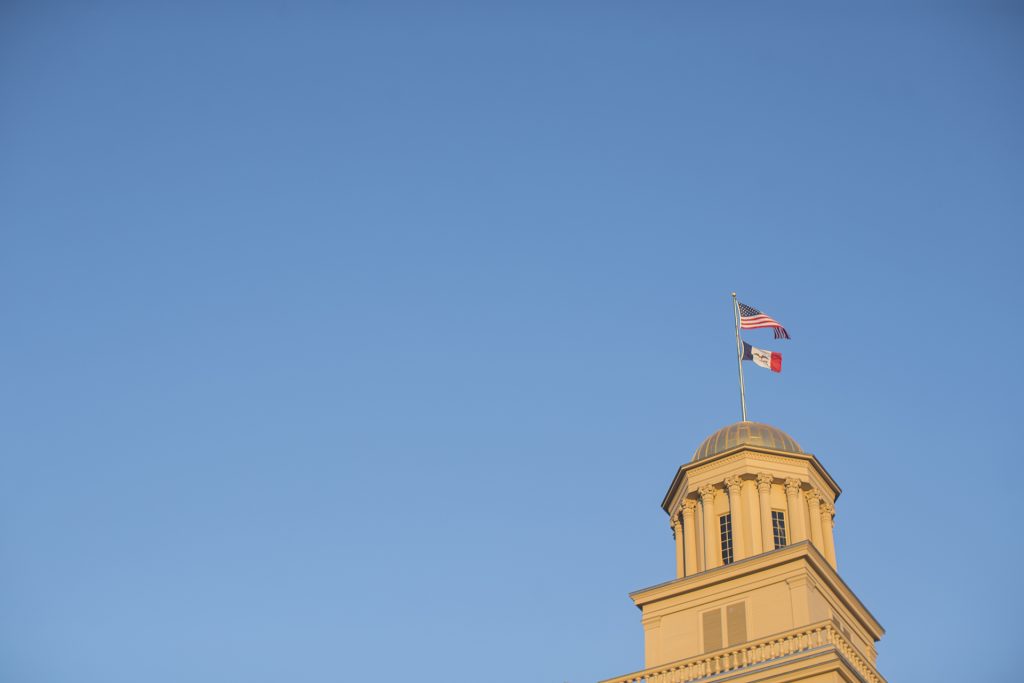As Iowa lawmakers return home for the summer holiday, The Daily Iowan took a look at the status of bills either rejected or passed by the Republican-controlled Legislature that kept university communities in mind. Some experienced sharp partisan divide, while others received unanimous support.
May 5 marked the end of the first Republican trifecta in state government in 20 years, in which all three branches of state government (the House, the Senate, and the governor) were controlled by Republicans.
Action passed this session that could affect the Iowa City community this coming year include midyear funding cuts to the regent universities, a bill that bans most abortions, and a bill cracking down on “Sanctuary Cities.”
At least in Iowa, college towns tend to lean Democratic. Three of the six counties that voted for Democrat Hillary Clinton in the last presidential election are home to Iowa’s three regent-governed public universities. In Johnson County, there is one Republican representative of the seven Johnson County lawmakers, while other university counties are split evenly between the parties.
University of Iowa Associate Professor of political science Tim Hagle said this could be because although many students register as independent voters, a large percentage of university faculty register as liberal or liberal-leaning, which could lead to some unfavorable views of university policies among Republicans.
Nationally, Republican perception of public universities has dropped in recent years, according to research from the PEW Research Center. The 2017 poll found 58 percent of Republican and Republican-leaning respondents viewed public universities have a negative effect on the way things are going in this country compared with 72 percent of Democratic respondents who positively viewed universities. However, a majority of people, 55 percent, responded favorably toward universities.
Hagle said he wasn’t surprised by the poll results.
“[There are] positive things that everyone can agree this is great, like a researcher won an award as opposed to this kooky professor did this weird thing in class,” Hagle said. “That’s where you see the difference in the political level of opinion of universities. Some people are pushing an estranged view, and that’s what makes the news.”
Hagle said he thought this kind of news affects lawmakers’ decisions at a general level, especially when making decisions about campus free speech.
“Lawmakers are going to see these stories or they have these experiences themselves,” Hagle said.
Johnson County Republican Party Chair Matt Evans, a 2017 graduate of the University of Iowa, said that while he doesn’t agree with a few policies enacted by universities nationwide, including free-speech zones, he generally views higher education as a benefit.
“Policies such as safe spaces and other attempts to make people feel good and cater to their feelings — I think it’s a slippery slope,” Evans said. “Whether you agree with them or not, I think it’s a way for us to have an open dialogue rather than shunning ideas just because it hurts people’s feelings, and I think it’s against the spirit of higher education in general.”
Here is a list of legislative action proposed this session aiming to either regulate or lend a helping hand to liberal-leaning college towns that we could see next session.
College campus free-speech bill: (SF 2344) The bill, introduced by Amy Sinclair, R-Allerton, aims to institutionalize less restrictive free-speech policies on campuses. The legislation was criticized by Democrats when an amendment was struck that allowed universities to prohibit student organizations from discriminating against members based on state or federally protected status. Some legislators have criticized the bill as being in response to a case at the UI in which the school deregistered student group Business Leaders In Christ in response to a complaint that the group denied a gay member a leadership position.
The bill passed the Senate but failed to make it through the House Education Committee.
Medical Amnesty: (SF 415) The bill would give immunity from alcohol- and substance-related crimes to those seeking or reporting a need of medical assistance. The bill is heavily supported by university students, intertwining the three public university student governments in advocating the bill’s passage.
The legislation passed out of the Judiciary Committee in March but was never brought to the floor.
Textbooks: (HF24) The bill would expand sales-tax exemptions for textbooks sold by private retailers. Already, the University of Iowa and Iowa State University offer sales-tax exemptions for textbooks, and this would expand the exemption to stores such as Iowa Book.



